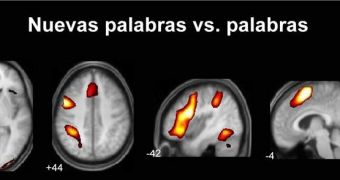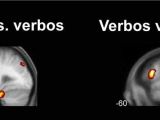A new investigation has recently revealed that the human brain is actually employing different areas when it comes to learning new nouns and verbs. This was shown by a research team that included two psychologists from Spain and a German neurologist. They used functional Magnetic Resonance Imaging (fMRI) to detect which portions of the brain lit up when words from each of the two categories were being processed. Details of their investigation appear in the February issue of the respected scientific journal Neuroimage, AlphaGalileo reports.
“Learning nouns activates the left fusiform gyrus, while learning verbs switches on other regions (the left inferior frontal gyrus and part of the left posterior medial temporal gyrus),” study researcher Antoni Rodriguez-Fornells tells SINC. He is a University of Barcelona Cognition and Brain Plasticity Unit scientist, and also the coauthor of the new journal entry. The expert cooperated closely with colleague psychologist Anna Mestres-Misse, who is now based in Germany, at the Max Planck Institute for Human Cognitive and Brain Sciences, in Leipzig. They were joined in their work by Thomas F. Munte, who is a neurologist at the Otto-von-Guericke University, in Magdeburg, Germany.
This type of study was based on differences that experts had observed in cognitive studies of adults over the years. People apparently prefer and react faster to nouns than verbs. Children too learn these words before they go near verbs. So the investigators wanted to see whether these differences were hardwired in the cortex. Their experiments were devised in such a way that participants learned new words from their context, rather than by reading them separately.
“This task simulates, at an experimental level, how we acquire part of our vocabulary over the course of our lives, by discovering the meaning of new words in written context. This kind of vocabulary acquisition based on verbal contexts is one of the most important mechanisms for learning new words during childhood and later as adults, because we are constantly learning new terms,” Rodriguez-Fornells says. “These results suggest that the same regions previously associated with the representation of the meaning of nouns and verbs are also associated with establishing correspondences between these meanings and new words, a process that is necessary for learning a second language,” the expert concludes.

 14 DAY TRIAL //
14 DAY TRIAL // 
